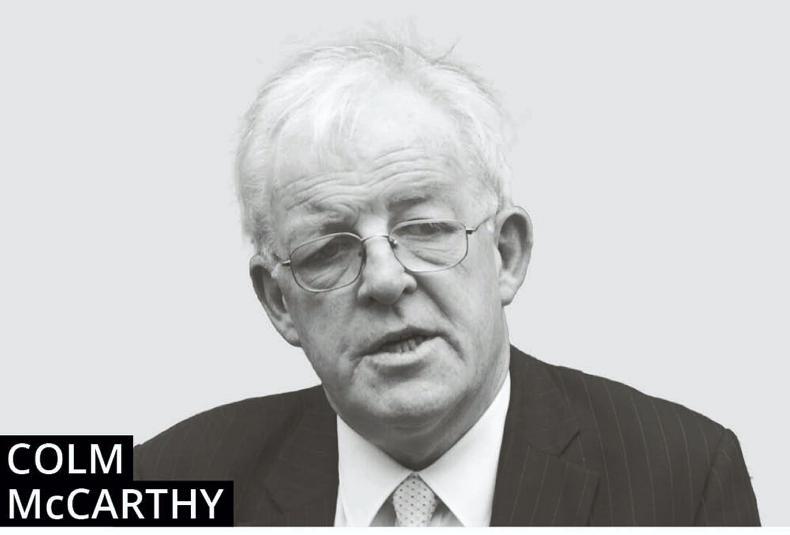Non-membership in the European single market is a permanent condition, not a once-off event. Brexit never ends and the consequences will play out for decades to come. As the UK’s negotiations with the European Union stumble to an interim conclusion, it should be clear that the drama is only beginning.
It has been a political accident from the start and the out-of-control atmosphere is a feature, not a bug.
In January 2013, prime minister David Cameron vowed, at a speech to a Bloomberg conference in London, to hold a referendum on UK membership of the EU, appeasing a minority of his parliamentary party – about one-quarter of MPs.
The government he led was in coalition with the pro-European Liberal Democrats and his promise would be activated only if the Conservative Party secured a majority on its own at the general election due two years later.
Britain has not equipped itself with a written constitution, so the status of national referendums is unclear
The Tory manifesto in April 2015 committed to an ‘in or out’ referendum, at a time when an outright Tory majority looked unlikely. The first accident was Cameron’s victory in the May election, on just 37% of the popular vote. The Lib Dem vote collapsed, they lost almost all of their seats and the big winners were the Scottish National Party. Cameron’s rash referendum pledge had to be honoured and the UK Independence party, plus the Europhobic Tory right, steered the Brexiteers to a narrow victory at the June 2016 referendum, 51.9% for Leave, 48.1% for Remain.
There had been no clear Leave majority in opinion polls prior to 2016 and the issue of Europe had never scored highly in “salience” (what is your most important issue) polling in earlier years.
There has also been a pro-EU majority in opinion polls since the referendum, recently around 57%, and mid-2016 seems to be the only period in recent British history when the Leave proposition would have won. Another accident.
Britain has not equipped itself with a written constitution, so the status of national referendums is unclear. In this country, a referendum ‘Yes’ vote alters the constitution there and then. In the UK in 2016, the referendum was deemed to be “consultative” but the large turnout meant that the result had to be heeded.
No clarity was offered by the Leave campaign, which won with slogans instead of a policy.
The conduct of policy ever since has been a car crash. Cameron’s successor Theresa May quickly pronounced that “Brexit means Brexit” and went on to disparage any of the rational soft Brexit options.
Trouble is, there is no alternative club open to applicants that has more agreeable playing partners
This extreme form of Brexit was not on the referendum ballot paper. No mandate was given, or even sought.
The general election of December 2019 was won decisively by May’s successor Boris Johnson, on a fatuous platform of “Get Brexit Done”, as if it involved resignation from a tennis club with irritating members.
Trouble is, there is no alternative club open to applicants that has more agreeable playing partners. Johnson’s ascent to the Tory leadership was a further accident, whose collateral damage has included a blustering failure to deal decisively with the pandemic. More immediately, the recent negotiations have not been about the terms of Brexit.
That deal was largely done, to Britain’s economic disadvantage, when the post-referendum Tory party turned Europhobic, insisting that the UK leave both the single market and the customs union. The modern Tories had been champions of tariff-free trade, of which the purest incarnation is a customs union.
Under Margaret Thatcher, the Tory government of the 1980s, not content with the completion of the customs union, pushed for the elimination of non-tariff barriers too, eventually playing the leading role in the creation of the single market.
Blame game
Thatcher’s legacy has undergone a rapid mutation, from the pro-business party of government to an inward-looking, populist movement increasingly English in character. Its twin preoccupations during 2021 will be the avoidance of blame for both Brexit and mishandling the pandemic.
On Brexit, the blame can be heaped on crafty and vengeful ‘foreigners’, ensuring a frosty relationship for years to come. The Brexiteer government will dodge accountability by keeping Europhobia alive and their media allies remaining on board. Avoiding blame for failures in public health policy will be easier, given the parallel failures around most of Europe.
It is salutary to think that the UK’s current travails, afflicted for the next four years with the poorest leadership that this writer can remember, came about through a series of political accidents.
There should be no smug satisfaction, in Ireland or in continental Europe, that “our lot are not as bad”. Political accidents can strike anywhere.









SHARING OPTIONS